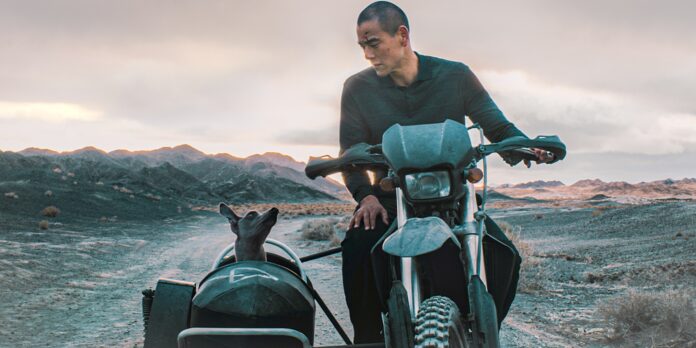THE STORY – Released from jail, Lang returns to his hometown in Northwest China. As part of a dog patrol tasked with clearing stray dogs before the 2008 Olympics, he bonds with a black stray. The two lonely souls embark on a new journey together.
THE CAST – Eddie Peng, Zhang-Ke Jia & Jing Liang
THE TEAM – Guan Hu (Director/Writer) & Ge Rui (Writer)
THE RUNNING TIME – 106 Minutes
The reason for the old showbiz adage about never working with kids and animals is that neither of those groups of co-stars can be predicted and must be less controlled. Eddie Peng is one of the biggest stars in Chinese cinema today, so the fact that he chose to act in this small movie about two lost souls – one human and one canine – is a surprise. Therefore, for “Black Dog” to have the emotional power it has, it needs a central performance that is towering and can stand up to any unpredictability. But somehow, the “Black Dog” crew got an amazing performance from the dogs – several played the lead canine and a black whippet – which matched Mr. Peng’s extraordinary work. The result is an unexpectedly emotional story of how incredible it is to find someone who loves you back in just the way both of you need; whether that someone is a person or an animal almost doesn’t matter.
It’s 2008, less than two months before the Beijing Olympics, a remote desert city is falling apart. Few factories are left, meaning the workers have fled, leaving whole sections of the city inhabited only by the pets left behind. There is such a problem with feral dogs that, as the film begins, they crash a passenger bus on the remote desert road into town. No one is hurt, including Lang Yonghui (Peng), who everyone on the bus recognizes and is surprised to see. Various people approach him, but Lang refuses to speak to anybody.
Peng does terrific work as a man who clearly has plenty of things to say and has a pretty good sense of humor. Still, Lang’s good cheer has been beaten out, and it’s simpler to keep his mouth shut. He can get away with this thanks to his local notoriety, of course. After settling in, he needs a job and joins a crew of dogcatchers trying to eliminate the dogs roaming the abandoned city. They’re on particular lookout for a black one, which definitely has bitten some people and probably has rabies. Lang, a deliberately terrible dogcatcher, knows where the black dog is and takes it upon himself to rehabilitate it. And just as the dogcatchers are hunting the black dog, it becomes clear a large crew of people are also hunting Lang.
It would be very simple to say that “Black Dog” is a story about how a dog and a man end up rehabilitating each other, but that simplifies this complex love story. For starters, this movie features world-class performances by dogs. In one scene, Lang’s only friend takes the dog’s registration photo and snaps at it to sit up properly for the official picture – which the dog does, somehow adjusting its facial expression to someone not smiling for a passport photo. How long did this take to shoot during production? It’s not like the dog can read the script! How Lang and the dog get used to each other is very charming, as Lang begins to pour all the love he’s bottled into caring for his dog. An excellent motorcyclist and mechanic, he builds a sidecar out of scrap metal and begins taking the dog on trips around the city. Some of these include observing Lang’s estranged father, the nearly abandoned city zoo’s caretaker, and the traveling circus with many pretty dancers currently passing through, one of whom Lang befriends (played by Liya Tong).
We also get to observe the city, shot by Gao Weizhe in a washed-out style, emphasizing the decrepitude and the tumbleweeds that roll through the desolate city. It’s at that precise moment before any gentrifiers have taken over, so everything in the production design is either collapsing, torn down, or wearing away from the weather. There’s a tremendous feeling of being scoured out in Lang himself and the city. But once you become accustomed to the harshness, the bottomless well of beauty becomes visible. Lang has plenty of friends in town, almost in spite of himself. They feed him for free and keep an eye on him, which counterbalances the violent grudge held against him by the powerful restauranteur named Butcher Hu. The choice not to show the movie’s only fight is also important. The combination of the city’s decay and the excitement in the air for the Olympics is a fine metaphor for rebirth, and every beat of the plot underscores the importance of giving people (and dogs) second chances.
The combination of this grim perspective of the environment and the heartwarming performances of its people and canines has made “Black Dog” one of the biggest surprises of this year’s Cannes Film Festival. For a movie so reliant on non-humans to achieve so consistent a mood is a breathtaking achievement by director Guan Hu, whose previous solo directing credit was “The Eight Hundred,” a massive war movie, kind of the opposite of this more subdued story. On the other hand, a war inside one man’s heart can be just as significant, and it’s always a pleasure to see a movie that knows the importance of love in any form.


